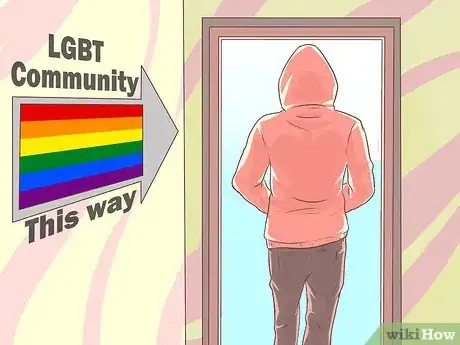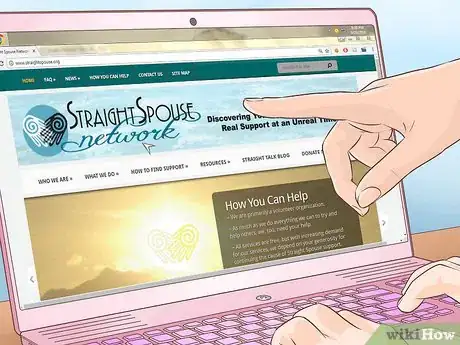This article was co-authored by Lauren Urban, LCSW. Lauren Urban is a licensed psychotherapist in Brooklyn, New York, with over 13 years of therapy experience working with children, families, couples, and individuals. She received her Masters in Social Work from Hunter College in 2006, and specializes in working with the LGBTQIA community and with clients in recovery or considering recovery for drug and alcohol use.
There are 10 references cited in this article, which can be found at the bottom of the page.
This article has been viewed 27,732 times.
Coming out to your spouse is a revelation. It will change your life and their life forever. It will change the way you interact, the way you narrate your past, and the way you plan your future. While there is great joy in accepting who you are, there is a lot of pain in reconfiguring an established partnership, especially in cases where deception has been practiced. Whether it's your sexuality or your gender that you are redefining, you will have to proceed carefully and muster all your strength and love.
Steps
Telling Your Spouse and Others
-
1Practice before telling your spouse. It can be hard to say exactly what you mean in a stressful moment. Your spouse may not understand everything at first, and may try to interrupt or derail you. Practice saying what you need to say before you say it to them.[1]
- Try writing it out first.
- Tell a friend or one of your family members who you know will be supportive and discreet. Explain that you need to talk to someone so that you can come out to your spouse effectively.
-
2Consider talking to an expert. If you want your spouse to be the first to know, try telling a therapist or a counselor first. Find a therapist who is experienced in dealing with LGBTQ issues. You can use the APA "Psychologist Locator" tool to search for someone who specializes in people in your situation.[2]
- Call a hotline such as the Helpline (0345 3 30 30 30) to discuss coming out with a trained specialist.
Advertisement -
3Find a private moment. Let your spouse know you want to talk about something serious. Make a date with them. Meet somewhere private, where your kids or other relatives won't bother you.[3]
- The exception to this is if your spouse has any violent tendencies. In this case, meet with a lawyer, a mediator, or another witness when you come out, and arrange for a place for you (and any children) to stay after you have come out.
- If you can't bring yourself to say it, or if you're afraid you'll leave something out, consider presenting a letter instead of speaking.
-
4Explain your exact truth. Tell your spouse exactly who you are. Explain how long you've suspected, how long you've known, and what has held you back from revealing the truth. For instance, if you're revealing a truth about your gender identity, you might say: "I've recently realized that what I am is a man—a transgender man. I've always felt different, like something was missing. When I was little I thought I'd grow up to be a man, and that my parents were wrong when they said otherwise. I didn't really have the language until recently. I told you as soon as I was sure."
- If you're coming out as bisexual, you might say "If I'm honest with myself, I always knew I was attracted to both men and women. I just thought if I ignored part of that, it would go away."
- Don't make it about them—your gender and sexuality have nothing to do with anyone else.
-
5Apologize and acknowledge their pain. This part is hard, because it may not feel like you chose to deceive your spouse. It's possible that you didn't understand what was going on until recently. It's also true that you may have felt like you had to stay closeted to survive. However, your spouse will need to hear you apologize and acknowledge their pain.[4]
- You might say "I'm so sorry that I'm not who I told you I was. I'm sorry I didn't come out sooner. I'm sorry that I'm putting you through pain."
- Prepare yourself for a response of shock and lots of questions. Try not to get defensive if you are met with a million questions. Show empathy for your spouse and try to answer their questions as patiently as possible.
-
6Be very clear on how you feel about them. If you still want to be with them, tell them. If you don't, say so. Explain exactly why. For instance, you might say "I want to stay with you if you will keep me. I love you, and you are my best friend. Our partnership is the most beautiful part of my life."[5]
- Conversely, you might say: "I don't have the feelings for you that I wish I did. I love you as a friend, but I can't continue to pretend it's anything else. I'd like to separate."
-
7Decide how to tell others together. Generally, it's best for your mental health to come out across the board. However, not all circumstances make this a safe or prudent option. Your spouse might not feel comfortable with you coming out immediately to your family and community. You yourself might have reservations. Make a plan together about who should be told (from everyone, to just family, to just certain family members), and how they should be told.
-
8Be open with your children. If you are safe enough in your community to be out, tell your children. You don't have to wait until they're adults—there is nothing child-inappropriate about minority genders or sexual orientations. You don't have to give them all the details of your marriage, but you and your spouse can explain who you are and what your basic feelings for each other are.
- Explain any terms they might not know.
- State clearly that you love them, and that nothing about your relationship will change.
- Help them understand the sorts of phobic remarks they might overhear, and why these are wrongheaded.
- Expect this to be an ongoing conversation.
Getting Support
-
1See a therapist. Find a licensed counselor who has expertise with LGBTQ concerns, with coming out in adulthood, and/or with major life transitions. In the United State, you can search by specialization with the APA locator: http://locator.apa.org/
- Talk to your therapist about the process of coming out, about your wishes going forward, and about any guilt or pain you feel.
- You and your spouse may wish to see a therapist together. Make sure you see an LGBTQ friendly therapist.
- Talk to the therapist on the phone beforehand. Eliminate anyone who suggests "reparative" or "conversion" therapy, or who considers homosexuality or transgenderism a "choice" or an "illness." These people will not be able to help you process your feelings, and they may do you harm.[6]
-
2Reach out to friends and family. Your spouse may not want you tell others, but you shouldn't have to suffer in loneliness and silence during this time. You need support—you're going through a major life transition. Talk to people you trust, and make time for visits with sympathetic friends.
-
3Join a community. You are not alone in your circumstances. Locate a nearby LGBT center, or search for LGBT support groups and peer counseling online. Contact other LGBT people you know and ask them to talk with you. Look for LGBT groups associated with organizations you can have access to, such as Unitarian churches, Quaker meeting houses, community centers, and other publicly accessible places.[7]
-
4Remind yourself why you are coming out. Although coming out will be hard, it is important to remind yourself that you are doing this to be true to yourself. Having a life where you can be yourself and pursue happiness will be worth the discomfort, chaos, and pain that coming out while married might cause.
Negotiating Your New Relationship
-
1Make a plan for the short term. Talk about what you both want. You'll need to decide what to do in the moment: consider taking a few days apart, or consider setting a date to reopen the subject.
- Your spouse may be in shock for a while, so let them process.
- If they say rash things, like that they never want to see you again or that you can't tell anyone, tell them you'd like to talk more about that at a later time.
-
2Make a plan for the long term. You'll need to decide whether or not to stay together, or if staying together for the moment is the best option. You may also be interested in staying together but with different terms: for instance, you might open your relationship up to non-monogamous encounters. If divorce is the best option, draw up terms that are fair to you both.
- Discuss your plans together with a therapist or a lawyer.
-
3Visit a couple's therapist. Consider visiting a therapist together whether or not you are interested in staying together as a couple. A therapist who is experienced in mixed-orientation marriages can help you communicate through this transition and can help you decide on an arrangement that works for you both.
-
4Suggest your partner check out the Straight Spouse Network. There are extensive resources for people like your spouse. Recommend that your spouse visit the chat rooms, read the information, and locate a support group: http://www.straightspouse.org/
- Support groups can be found in countries worldwide and all over the United States.[8]
-
5Consider an open marriage. If you and your spouse would like to stay together, but one or the other of you feels the need to be sexually involved elsewhere, try to negotiate an open marriage. This might include: both of you freely dating others, but remaining primary partners; one of you dating others and either sharing or not sharing the details; the two of you staying married but one or both of you seeking equal or greater partnership elsewhere; both of you seeking a third partner to join your marriage, or other variations.[9]
- This will only work if both partners agree and stay open to communicating and renegotiating the terms.
- Start slowly and with consideration for the adjustment period.
- Consider seeing a therapist familiar with polyamorous or mixed-orientation marriages.
-
6Negotiate a fair divorce. You and your spouse will both need lawyers to help you negotiate this divorce. If your spouse has been hostile since you came out, you may need to be extra vigilant during this process—especially if you have children.
- If you had an affair during the marriage, have children, and fear your spouse will sue you for custody, speak to a lawyer before you reveal any infidelity.
- Warn your lawyer or mediator of signs of Parental Alienation Syndrome—if your spouse has been disparaging you or making homophobic/transphobic remarks in front of your children, your mediator will need to take an alternative approach to your mediation process.[10]
Expert Q&A
-
QuestionWhat is the best way to come out?
 Lauren Urban, LCSWLauren Urban is a licensed psychotherapist in Brooklyn, New York, with over 13 years of therapy experience working with children, families, couples, and individuals. She received her Masters in Social Work from Hunter College in 2006, and specializes in working with the LGBTQIA community and with clients in recovery or considering recovery for drug and alcohol use.
Lauren Urban, LCSWLauren Urban is a licensed psychotherapist in Brooklyn, New York, with over 13 years of therapy experience working with children, families, couples, and individuals. She received her Masters in Social Work from Hunter College in 2006, and specializes in working with the LGBTQIA community and with clients in recovery or considering recovery for drug and alcohol use.
Licensed Psychotherapist There is no single, correct way to come out. Some people prefer coming out to close friends and family all at once, while other people prefer coming out individually to the people that they care about. It's really entirely up to you; you should come out however you feel most comfortable doing it.
There is no single, correct way to come out. Some people prefer coming out to close friends and family all at once, while other people prefer coming out individually to the people that they care about. It's really entirely up to you; you should come out however you feel most comfortable doing it. -
QuestionWhere can I get support when coming out?
 Lauren Urban, LCSWLauren Urban is a licensed psychotherapist in Brooklyn, New York, with over 13 years of therapy experience working with children, families, couples, and individuals. She received her Masters in Social Work from Hunter College in 2006, and specializes in working with the LGBTQIA community and with clients in recovery or considering recovery for drug and alcohol use.
Lauren Urban, LCSWLauren Urban is a licensed psychotherapist in Brooklyn, New York, with over 13 years of therapy experience working with children, families, couples, and individuals. She received her Masters in Social Work from Hunter College in 2006, and specializes in working with the LGBTQIA community and with clients in recovery or considering recovery for drug and alcohol use.
Licensed Psychotherapist You don't have to go through this alone! Talk to friends in the LGBTQ+ community or look for an organization to join. Consider joining a support group to get advice and encouragement.
You don't have to go through this alone! Talk to friends in the LGBTQ+ community or look for an organization to join. Consider joining a support group to get advice and encouragement.
References
- ↑ https://www.psychologytoday.com/blog/fulfillment-any-age/201507/5-ways-deliver-bad-news-minimum-pain
- ↑ http://locator.apa.org/
- ↑ http://www.huffingtonpost.com/diane-gottsman/apology-etiquette-its-nev_b_3378474.html
- ↑ https://www.psychologytoday.com/blog/pura-vida/201105/the-forgiveness-protocol-how-apologize-when-you-have-hurt-or-harmed-another
- ↑ https://hbr.org/2010/10/difficult-conversations-9-common-mistakes
- ↑ www.hrc.org/resources/the-lies-and-dangers-of-reparative-therapy
- ↑ Lauren Urban, LCSW. Licensed Psychotherapist. Expert Interview. 3 September 2018.
- ↑ http://www.straightspouse.org/test/face2face-support-groups/
- ↑ http://www.straightspouse.org/resources-new/recommended-reading/personal-stories-out-together/



























-Step-14-Version-2.webp)
















































